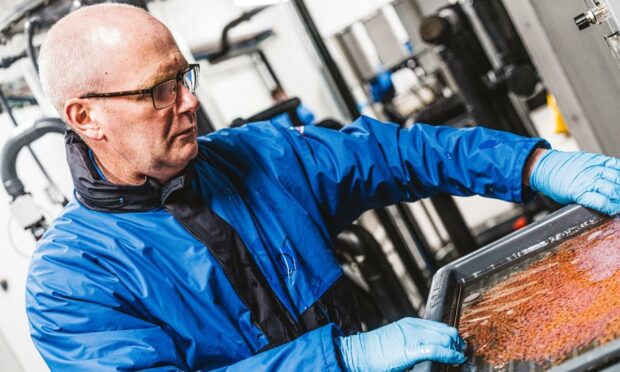Scottish Sea Farms is set to take delivery of the first eggs bred from salmon grown at its own marine farms in Scotland – in a move described as a “key milestone”.
The organisation has collaborated with breeding specialists AquaGen aimed at future-proofing farmed fish welfare in the face of climate change.
Traditionally, salmon eggs are imported to Scotland then reared in freshwater hatcheries before being transferred to marine farms for growing.
However, since 2020, Scottish Sea Farms has been working with AquaGen to select the best performing fish from its own marine farms and produce offspring from those.
Multi-million pound hatchery to take delivery
The eggs are due to be delivered to the £5.8million Barcaldine Hatchery, near Oban, in January and will then be transferred to the company’s marine farms around Scotland’s west coast and Northern Isles.
Dr Ralph Bickerdike, Scottish Sea Farms head of fish welfare, said: ‘Ultimately, we’re seeking to match the right stock to the right conditions in order to maximise fish welfare.
“As climate conditions continue to change – and with it, the marine environment – we’re acting now to help ensure future stocks can withstand those changes.”
The initiative aims to maximise fish welfare once at sea, by improving overall robustness to Scottish marine conditions and increasing resistance to the health challenges that the changing environment can give rise to – in particular, gill health which is now thought to be one of the biggest challenges facing farmed salmon globally.
Breeding programme to develop
Mr Bickerdike added: “Climate change presents challenges to livestock farmers of all kinds.
“For salmon farmers, this summer’s record high temperatures and lower than average rainfall have given rise to increased incidence of gill health issues.
“At some farms, fish stocks have been able to overcome such challenges and bounce back to full health.
“At other individual farms, we’ve seen significant losses, indicating that some salmon are naturally more resistant than others.”
Helping determine which genetic selection might offer the greatest resistance is an integral element of the breeding programme.
Whilst this work is at an early stage, the partners hope to have robust genomic data as soon as three years from now – a timescale that could be shortened further with knowledge exchange from Scottish Sea Farms’ other research projects in this area.
Future partnerships lined up
These include a collaboration with the University of Aberdeen, feed specialists BioMar, Marine Scotland Science and the Sustainable Aquaculture Innovation Centre to increase understanding of how seasonality and location influence gill health and how farmed salmon respond to these challenges.
Andrew Reeve, AquaGen Scotland managing director, said: ‘Stock selection is an ongoing process.
“Just as the climate continues to change, so too does the best breeding to withstand those changes.
“Having selected the best performing fish from Scottish Sea Farms marine farms, we’re now able to apply the latest technologies and approaches to identify the key traits that have helped these superior grade fish continue to thrive in the Scottish marine environment.”
Other producers of Scottish farmed salmon are now adopting similar breeding programmes with Cooke Aquaculture Scotland working with AquaGen, the Scottish Salmon Company working with Hendrix Genetics and most recently MOWI Scotland announcing its own in-house initiative to select stock types best tailored to Scottish marine conditions.
